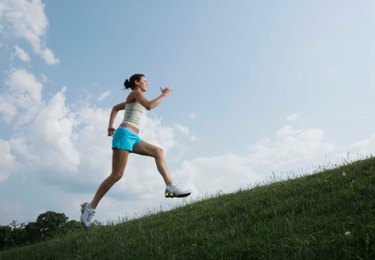
A test to determine VO2 max measures the maximum amount of oxygen you can take in during maximum exertion. Measuring oxygen uptake is one way of measuring exercise intensity. VO2 max is also an indicator for endurance for sports such as cross-country skiing, triathalons and long-distance running. Even with optimal training, your VO2 max can limit or enhance your performance. Both internal and external factors affect VO2 max.
Gender
Video of the Day
Women have a lower VO2 max than men. This is primarily due to physiology. The amount of blood your heart can pump partially determines VO2 max. Blood pumping is a function of the length of the stroke of the valves, the type of fibers in the heart muscle and the size of the heart. Men, who are generally physically larger than women, have larger hearts that pump more blood. They also have larger lungs to take in more oxygen.
Video of the Day
Age
Younger people generally have great VO2 max than older ones. Both males and females ages 18 to 25 have the peak VO2 max of their lives, with gradual declines as they get older. Prior to about 18, the body has not developed to its full capacity. After about age 25, your VO2 max declines at a rate of approximately 1 percent a year.
Genetics
Heredity plays a role in the type of muscle fibers you have in your heart, the size of your body, including heart and lungs, and your heart's pumping capacity. Cerritos College in California reports that genetics accounts for 20 to 30 percent of your VO2 max.
Altitude
Lower air pressure makes oxygen less available in higher altitudes. The pressure of oxygen in arterial blood also decreases at altitude, lowering your VO2 max.
Size
The bigger your body, the greater your VO2 max is likely to be. Larger people have larger hearts and lungs, and therefore more capacity for oxygen.
Temperature
The outside air temperature can affect VO2 max, as you consume more oxygen more easily at warmer temperatures.
Is this an emergency? If you are experiencing serious medical symptoms, please see the National Library of Medicine’s list of signs you need emergency medical attention or call 911.